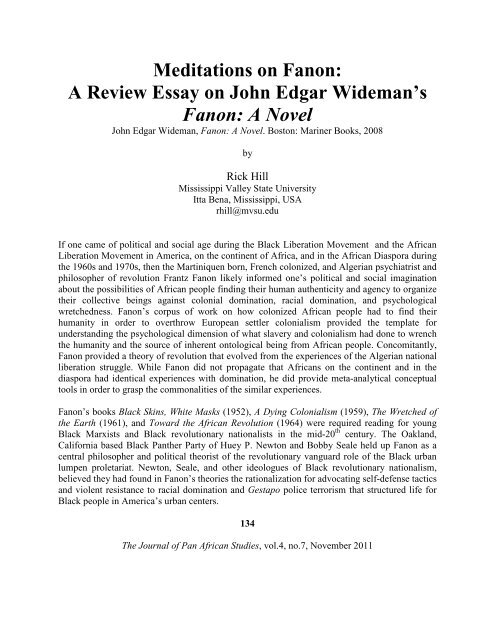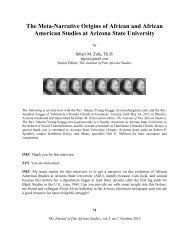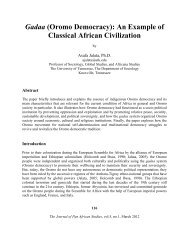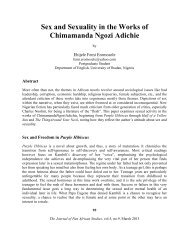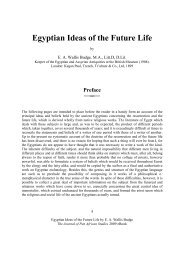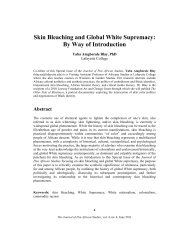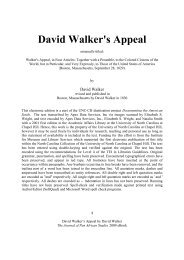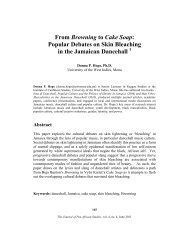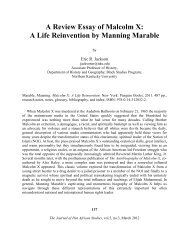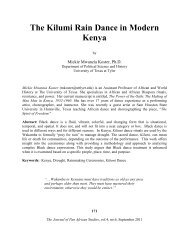view PDF - Journal of Pan African Studies
view PDF - Journal of Pan African Studies
view PDF - Journal of Pan African Studies
Create successful ePaper yourself
Turn your PDF publications into a flip-book with our unique Google optimized e-Paper software.
Meditations on Fanon:<br />
A Re<strong>view</strong> Essay on John Edgar Wideman’s<br />
Fanon: A Novel<br />
John Edgar Wideman, Fanon: A Novel. Boston: Mariner Books, 2008<br />
by<br />
Rick Hill<br />
Mississippi Valley State University<br />
Itta Bena, Mississippi, USA<br />
rhill@mvsu.edu<br />
If one came <strong>of</strong> political and social age during the Black Liberation Movement and the <strong>African</strong><br />
Liberation Movement in America, on the continent <strong>of</strong> Africa, and in the <strong>African</strong> Diaspora during<br />
the 1960s and 1970s, then the Martiniquen born, French colonized, and Algerian psychiatrist and<br />
philosopher <strong>of</strong> revolution Frantz Fanon likely informed one’s political and social imagination<br />
about the possibilities <strong>of</strong> <strong>African</strong> people finding their human authenticity and agency to organize<br />
their collective beings against colonial domination, racial domination, and psychological<br />
wretchedness. Fanon’s corpus <strong>of</strong> work on how colonized <strong>African</strong> people had to find their<br />
humanity in order to overthrow European settler colonialism provided the template for<br />
understanding the psychological dimension <strong>of</strong> what slavery and colonialism had done to wrench<br />
the humanity and the source <strong>of</strong> inherent ontological being from <strong>African</strong> people. Concomitantly,<br />
Fanon provided a theory <strong>of</strong> revolution that evolved from the experiences <strong>of</strong> the Algerian national<br />
liberation struggle. While Fanon did not propagate that <strong>African</strong>s on the continent and in the<br />
diaspora had identical experiences with domination, he did provide meta-analytical conceptual<br />
tools in order to grasp the commonalities <strong>of</strong> the similar experiences.<br />
Fanon’s books Black Skins, White Masks (1952), A Dying Colonialism (1959), The Wretched <strong>of</strong><br />
the Earth (1961), and Toward the <strong>African</strong> Revolution (1964) were required reading for young<br />
Black Marxists and Black revolutionary nationalists in the mid-20 th century. The Oakland,<br />
California based Black <strong>Pan</strong>ther Party <strong>of</strong> Huey P. Newton and Bobby Seale held up Fanon as a<br />
central philosopher and political theorist <strong>of</strong> the revolutionary vanguard role <strong>of</strong> the Black urban<br />
lumpen proletariat. Newton, Seale, and other ideologues <strong>of</strong> Black revolutionary nationalism,<br />
believed they had found in Fanon’s theories the rationalization for advocating self-defense tactics<br />
and violent resistance to racial domination and Gestapo police terrorism that structured life for<br />
Black people in America’s urban centers.<br />
134<br />
The <strong>Journal</strong> <strong>of</strong> <strong>Pan</strong> <strong>African</strong> <strong>Studies</strong>, vol.4, no.7, November 2011
To be sure, Fanon was not decontextualized by Black Marxists and revolutionary nationalists. In<br />
The Wretched <strong>of</strong> Earth, which describes Algerians within a colonial, urban milieu fighting<br />
against the France and their own self-marginalization, Fanon tells a story that is similar to the<br />
ethos <strong>of</strong> Black urban life in the United States. The <strong>African</strong> (native) Manichaean personality,<br />
Fanon <strong>view</strong>s and describes through his psychiatric lens, tells <strong>of</strong> the universal struggle <strong>African</strong><br />
people in the American diaspora faced since they were brought to the shores <strong>of</strong> the North<br />
American continent as slaves.<br />
Fanon has been in the critical consciousness <strong>of</strong> Black people inside the United States since the<br />
mid-20 th century. His theories <strong>of</strong> revolution have informed the internal psychological agency and<br />
external guttural urgencies <strong>of</strong> Black people to confront the oppressive, dominant American state.<br />
Therefore, Wideman’s Fanon represents a sort <strong>of</strong> post-modernist statement on Fanon’s place in<br />
the Black imaginary, as it evokes us to look back on a time when many <strong>of</strong> us, coming <strong>of</strong> age in<br />
1950s, 1960s, and the 1970s, really believed revolution was possible and it would happen in our<br />
times. After all, it had happened in Algeria in the mid-1950s and it had happened in the national<br />
liberation struggles <strong>of</strong> the Portuguese colonies <strong>of</strong> Guinea Bissau, Angola and Mozambique in the<br />
1960s.<br />
Wideman’s novel can be described as a meditation on Fanon. His narrator seems to be in search<br />
<strong>of</strong> a way to find Fanon both within Wideman’s own literary process and his effort to find in<br />
Fanon a thought-voice through which to understand the troubles <strong>of</strong> an early-21 st century world in<br />
which the old Third World has forced its way onto the gaze and into the consciousness <strong>of</strong> a<br />
western world that has long since dispossessed it. But, Wideman’s Fanon cannot write <strong>of</strong> these<br />
things in clear, unambiguous terms, because he knows the world is his narrator. Those who are<br />
writing to Fanon and his writer, Thomas, and who are writing about Fanon, must confront many<br />
<strong>of</strong> the symbols and signs <strong>of</strong> the old world that will not dissipate. Will race go away? Will race<br />
continue to define humanity? Will human beings be diminished if they are continually raced?<br />
These are big questions that Wideman needs his narrator or Thomas or Fanon to answer. But,<br />
they are questions Wideman can continue to beg, because the Fanon we know, from his books,<br />
was unable to escape the “moral evil” <strong>of</strong> race. The colonial, slavery, racial domination projects<br />
were and are about race and power.<br />
135<br />
The <strong>Journal</strong> <strong>of</strong> <strong>Pan</strong> <strong>African</strong> <strong>Studies</strong>, vol.4, no.7, November 2011
Why Fanon? Wideman’s brother Rob, who is serving a life sentence for murder and is the<br />
subject <strong>of</strong> Wideman’s critically acclaimed 1995 memoir, Brothers and Keepers, asks. Wideman<br />
never really answers the question. Though, he does provide a meditation <strong>of</strong> sorts. He uses Fanon<br />
as a vessel through which questions <strong>of</strong> the navigation <strong>of</strong> the human project might be pr<strong>of</strong>fered.<br />
Wideman brings together autobiography, biography, fiction, and memoir. He places Fanon in the<br />
midst <strong>of</strong> late-20 th century and early-21 st century cultural moments and social questions. Fanon<br />
reads like a search for a certain kind <strong>of</strong> meaning in life and Frantz Fanon is Wideman’s muse in<br />
this search.<br />
For those <strong>of</strong> us who continue to re-read and rethink Fanon’s philosophy, Wideman leaves<br />
enough space in his search and use <strong>of</strong> Fanon to permit us to make this search ours too.<br />
136<br />
The <strong>Journal</strong> <strong>of</strong> <strong>Pan</strong> <strong>African</strong> <strong>Studies</strong>, vol.4, no.7, November 2011


